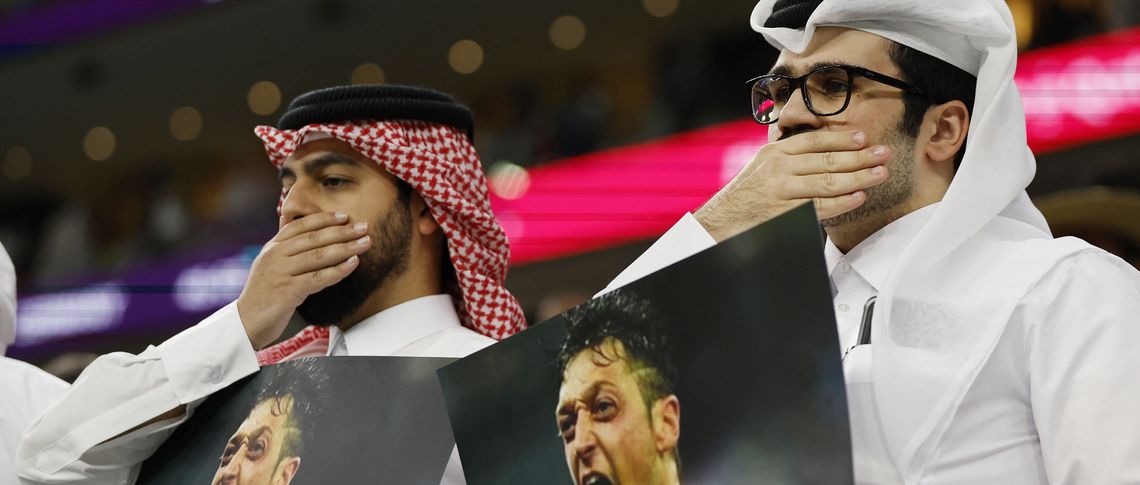A lot of Germans and other Westerners are criticising the Football World Cup in Qatar. How does the Arab world see it?
Many football fans from the region are pleased with the World Cup – but for different reasons. The Arab-nationalist fans say, ‘what’s most important is that it’s being held in an Arabic-speaking country.’ Others welcome the fact that the World Cup is taking place in the Islamic world: they would have been just as happy to have Indonesia as host. Although countries in the region blockaded Qatar between 2017 and 2021, football fans from Saudi Arabia, the United Arab Emirates and Oman rejoice that the World Cup is being held locally, with many taking advantage of its proximity to attend – even if their countries aren’t competing.
How are the host and its team perceived? During the group stage, there were photos of an ‘Arab curve’ that supposedly included fans from several North African countries.
The ‘Arab curve’ is a Qatari initiative made up of people who rehearsed for the World Cup for weeks, wearing Qatari t-shirts, singing the national anthem and beating drums. Their leader comes from the Ultras Supernova of the Nejmeh Sporting Club, one of Lebanon’s major football associations. Most Arab curve members are fans from Tunisia, Egypt and Algeria, who live and work in Qatar. So, to some extent, that was staged. However, most Arab ‘ultras’ – football fanatics – really do back Qatar. Although they may not travel to the games, they support the World Cup host in their home stadiums. The ’Mean Green Machine’ of Al Wehdat Sports Club in Jordan and Iraqi Al-Quwa Al-Jawiya fans displayed banners and team flags supporting Qatar even before the World Cup began – explicitly as a counter-action to ‘Boycott Qatar’.
How do people in the region view the debates surrounding the World Cup as they are being held in Germany and other Western European countries?
The Arab discussions are totally different. Big broadcasters, such as Al Jazeera from Qatar and Al Arabiya from Saudi Arabia, criticise the partly absurd western arguments against Qatar hosting the games in which some fans insist that the World Cup shouldn’t be held in winter: ‘It’s unimaginable to be watching the games and drinking gluhwein at a Christmas market!’ And some Arab media react by saying, ‘look at those Eurocentrics!’ If the World Cup always has got to be held in summer, not just Qatar is excluded as host, but also a whole range of other countries. So that’s how many Arab media outlets are portraying the boycott debate.
I think one concern that does justify a boycott is the human rights situation in Qatar, especially with respect to construction workers and homosexuals. However, in the Arab world, there’s hardly any discussion about construction workers’ rights. People there say that Qatar provides for much-needed jobs. As for homosexuality, many Arabs are proud of their conservative values and don’t think homosexuality should be tolerated. The promise that all are welcome is actually a big façade. Qatar’s World Cup ambassador who spoke of ‘damage in the mind’’ was one of the few honest officials. People agree with him and celebrate every ban of the rainbow flag as a victory.
How does the Arab world react to western moral arguments?
The big issue in the Arab world is not morals but double standards. Just talk with Iraqis: they still remember 2003 and the resulting American war crimes. Many in the Arab world are fed up with western finger-pointing and telling them how things should be improved. They can’t stand westerners constantly criticising their human rights situation – although in individual cases it’s perfectly justified. They just don’t want to hear that from the West. Even valid criticism from the West is immediately stonewalled. If the criticism came from Turkey, for example, people would be much more likely to listen.
How did the Arab world react to the German national team’s elimination?
With schadenfreude – at least from Arabs who aren’t fans of Germany. Some Gulf journalists mocked the German team on their social media channels. They explained that the Germans had been knocked out because they hadn’t concentrated on playing.
In Germany, football is becoming more and more political – especially in the media. You research fan culture and football in the Arab world. How political is football there?
Football is political in the Arab world as well but in a different way. In the West, football has become disconnected from its origins. It’s become very capitalistic. Lots of German, English, French and Italian club managers view football as a product that has to be profitable. Fans react to that by protesting in the streets – which automatically becomes a political issue. But in most Arab countries there’s hardly any profit to be made from the game.
In Syria, for example, there has never been anything to earn from football – neither from TV rights nor other types of lucrative contracts. The Arab fans’ dissatisfaction is not linked to the development of football per se, but rather to social developments in the different countries. They use stadiums to protest en masse – as we’ve seen in Tunisia and Algeria. Westerners’ dissatisfaction has to do with how football has become a commodity, whereas that of Arab fans is linked to their socio-political situation. Stadiums are open to people from all walks of life – which makes them natural venues for protesting.
What role and influence do ultras have in Arab societies?
Ultras were not politically active before the Arab spring. But they were good at supporting teams, collecting money and staging choreographed sequences, while their well-organised structures were a help for rallies and political demonstrations. One example is the Egyptian Al-Ahly and Zamalek ultras who played a big role in the revolution, at least in the streets. In Algeria, protest songs meant for the stadium were sung in the street.
This interview was conducted by Nikolaos Gavalakis.






